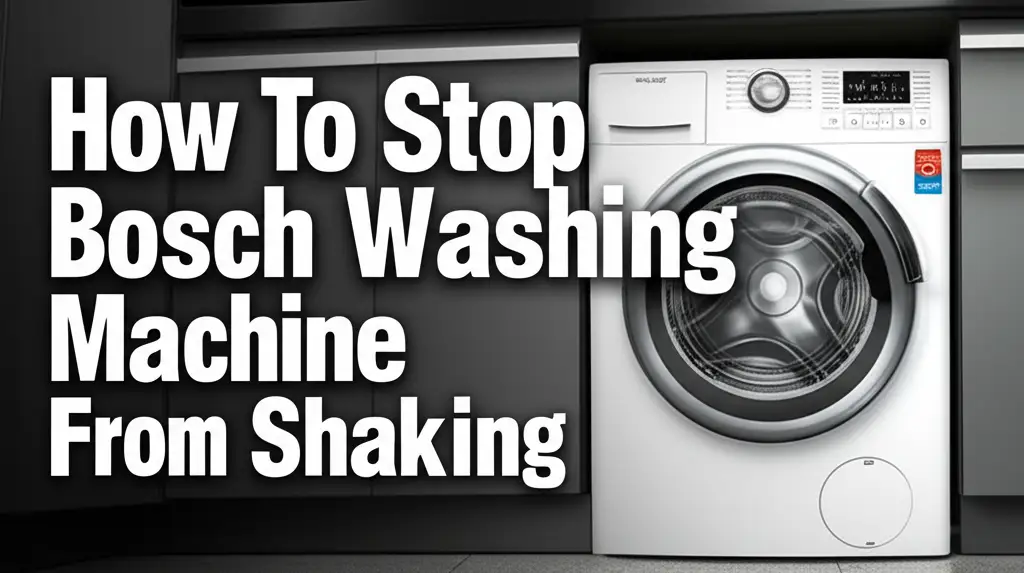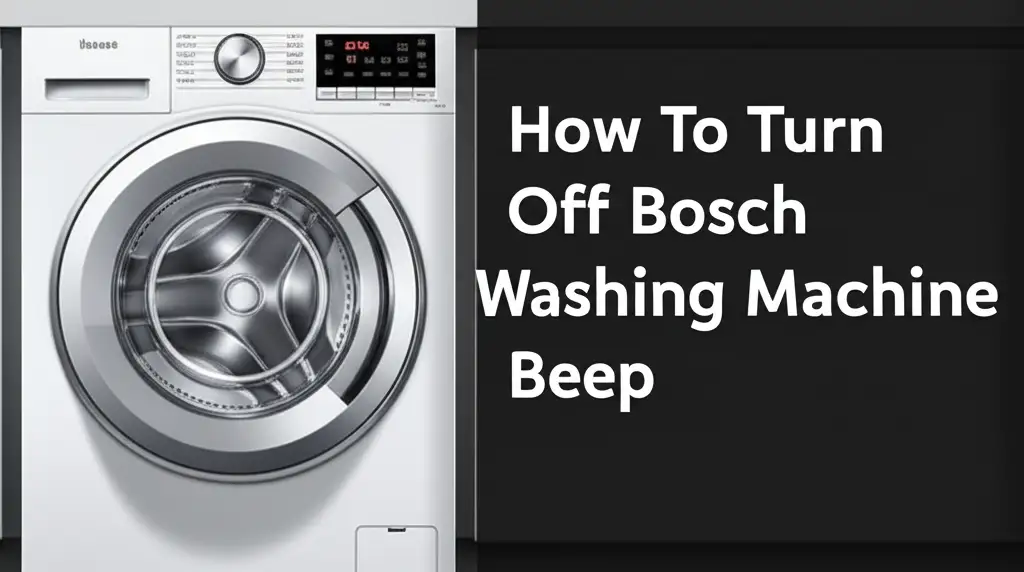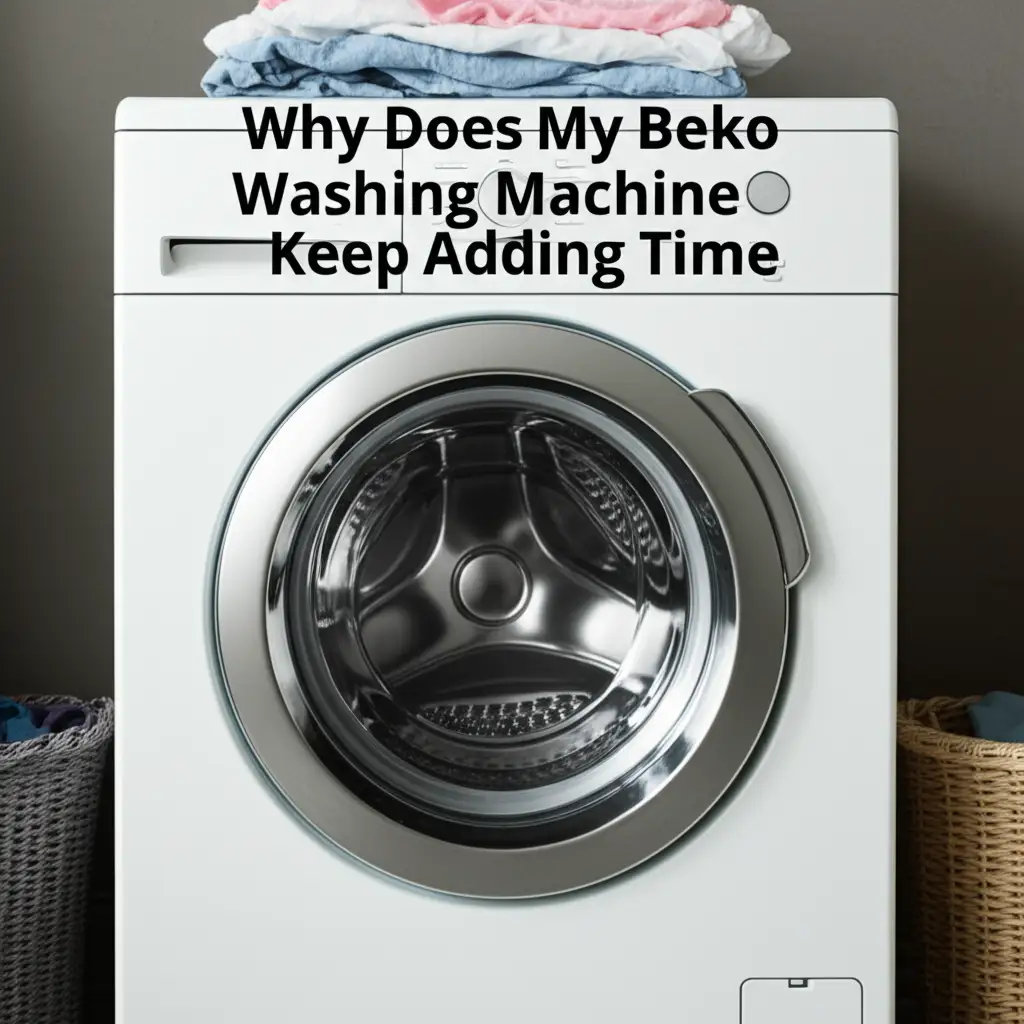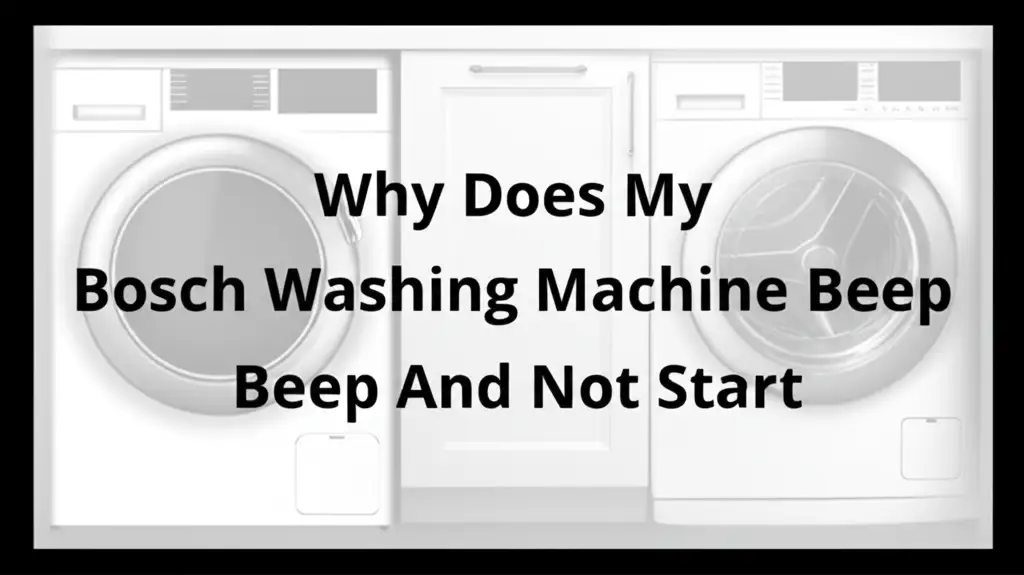· Todd Martin · Home Appliances · 17 min read
Why Does Bosch Washing Machine Take So Long
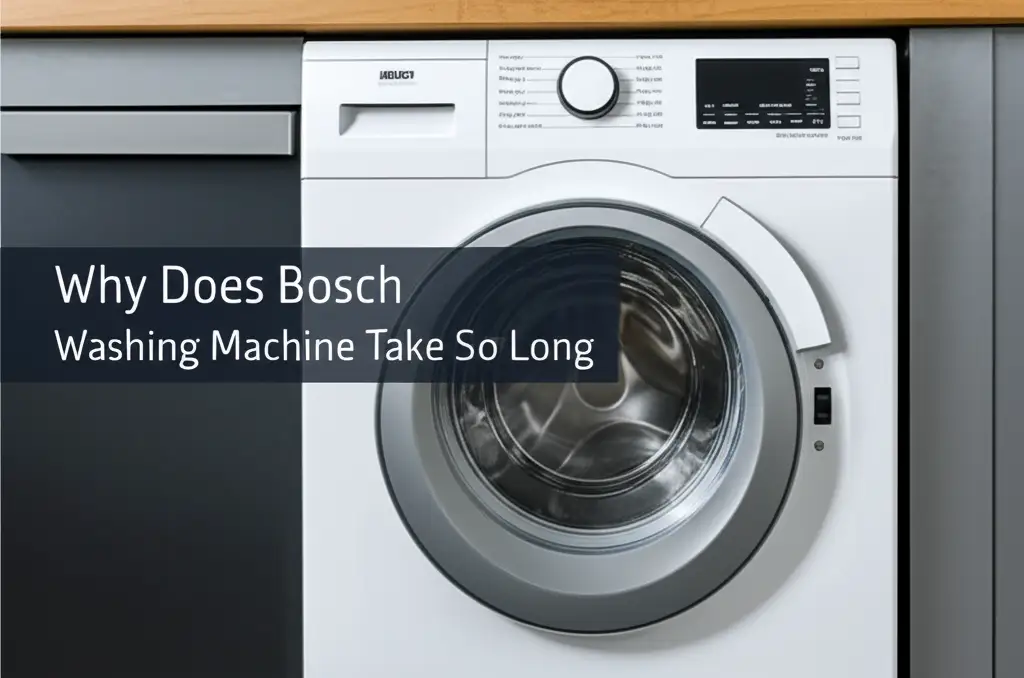
Why Your Bosch Washing Machine Takes So Long: A Deep Dive
Have you ever loaded your Bosch washing machine, pressed start, and then wondered if it’s actually stuck in a time loop? It is a common question: why does Bosch washing machine take so long to finish a cycle? Many Bosch owners experience this feeling. You expect a quick wash, but the timer seems to stretch on forever.
Modern washing machines, especially high-efficiency models like Bosch, operate differently from older units. They prioritize energy and water conservation. This shift in design directly impacts cycle length. My goal with this article is to explain the underlying reasons for these extended wash times. We will explore everything from advanced sensor technology to common user mistakes and necessary maintenance. You will learn how to optimize your laundry routine and understand your appliance better.
Takeaway
- Understand Bosch’s Design: Longer cycles often mean better energy and water efficiency.
- Check Your Settings: Eco-friendly programs are longer by design; select “Quick Wash” for speed.
- Optimize Your Load: Avoid overloading; it can make cycles much longer.
- Regular Maintenance: Clean filters and check water supply to prevent slowdowns.
- Detergent Matters: Use the right amount of high-efficiency detergent to prevent excessive foam.
The Core Reason for Extended Bosch Wash Cycles
A Bosch washing machine takes longer due to its design. It prioritizes water and energy efficiency. These machines use less water, requiring more time for clothes to fully soak and clean. Built-in sensors also adapt cycle length based on load size and soil level. This ensures thorough cleaning and optimal resource use for every wash.
The Philosophy Behind Longer Cycles: Energy & Water Efficiency
Bosch washing machines are engineered with a strong focus on sustainability. This commitment often translates into longer wash cycles. Older machines used a lot of water and energy. They relied on sheer volume and power to get clothes clean. Modern Bosch appliances, however, use a different method. They consume significantly less water and electricity. This is a core reason why your Bosch washing machine takes so long.
Using less water means the machine needs more time to properly saturate fabrics. It then needs to effectively agitate and rinse them. The water content is lower, so the cleaning action relies on precise movements and extended soaking periods. This ensures detergent dissolves correctly and dirt washes away. Bosch’s innovative EcoSilence Drive motor plays a role here. It operates quietly and efficiently, but it works within these longer, more resource-conscious cycles. The goal is to deliver spotless laundry while minimizing environmental impact. Many people ask, “Why does Bosch washing machine take so long?” This efficiency is a big part of the answer. It is a trade-off: time for resources saved. This approach is common in many modern, high-efficiency appliances, not just Bosch. For example, Samsung washing machines also extend cycle times for efficiency.
Advanced Sensor Technology and Load Optimization
Bosch washing machines come equipped with sophisticated sensor technology. These intelligent systems aim to optimize every wash cycle. They ensure your clothes receive the best possible care. They also ensure the machine uses resources efficiently. This advanced technology directly influences why your Bosch washing machine takes so long. It does so by adapting to various conditions.
One key feature is Bosch’s ActiveWater Plus system. It detects the precise load size in the drum. It then determines how much water is truly needed. If you put in a small load, the machine will use less water. If you put in a large load, it will use more. This calculation takes a moment at the beginning of the cycle. The machine also assesses the type of fabric and the soil level of your laundry. Sensors analyze how absorbent the fabric is. They also check how dirty the water becomes during the initial stages. Based on this data, the machine adjusts the water intake, detergent dosage, and even the cycle duration. For instance, a heavily soiled load will naturally require more time. The machine will add extra rinses or longer wash phases. Bosch’s i-DOS automatic dosing system is another example. It senses the detergent and fabric softener needs for each load. This system ensures optimal cleaning without using too much product. Using too much detergent creates excessive foam. This foam can trigger extra rinse cycles. These additional rinses extend the overall wash time. All these adjustments and assessments by the machine’s sensors add time to the cycle. They contribute to the perception that your Bosch washing machine takes so long. These are not flaws but features designed for smarter, more effective washing.
Understanding Bosch Wash Programs and Settings
The wash program you select greatly impacts how long your Bosch washing machine takes. Bosch offers a variety of programs. Each one is designed for specific fabric types and soil levels. Understanding these programs helps manage your laundry time. It also ensures the best care for your clothes.
- Eco Programs (e.g., Eco 40-60, Cottons Eco): These cycles are specifically engineered for maximum energy efficiency. They operate at lower temperatures for longer durations. This allows the detergent enzymes more time to work effectively. It significantly reduces electricity consumption. This is a primary reason why your Bosch washing machine takes so long on these settings.
- Standard Programs (e.g., Cottons, Synthetics): These programs balance cleaning performance and cycle time. They are suitable for everyday laundry. Their duration depends on the selected temperature and spin speed.
- Special Programs (e.g., Delicates, Wool, Silk): These cycles are gentle. They use less agitation and lower spin speeds. This protects delicate fabrics. They may still take a significant amount of time to ensure thorough but careful cleaning.
- Quick Wash Programs (e.g., Super Quick 15/30, Mixed Load): These are the fastest options. They are ideal for lightly soiled items or small loads you need quickly. However, they use more water and energy relative to the cleaning power. They may not clean heavily soiled items well. You might specifically choose one of these if you are thinking, “I wish my Bosch washing machine did not take so long.”
Beyond the main programs, additional settings also extend cycle times. Selecting “Pre-wash” adds an initial soak and rinse phase. “Extra Rinse” adds one or more rinse cycles. This is useful for people with sensitive skin or in areas with hard water. High spin speeds take longer to achieve. The machine gradually increases the drum speed. This ensures stability and proper water extraction. Always choose the most appropriate program for your laundry. Selecting the wrong program can lead to inefficient washing. It can also prolong the cycle unnecessarily. Knowing your settings is key to managing wash times. You can also learn how to get your Bosch washing machine to spin only if you just need to extract water.
Common User Errors and Their Impact on Cycle Duration
Sometimes, the reason your Bosch washing machine takes so long is not a fault with the machine. It is often related to how you use it. User errors are a common cause of extended wash times. Understanding these mistakes can help you optimize your laundry routine.
- Overloading the Machine: This is perhaps the most frequent culprit. Putting too many clothes into the drum can severely impact performance. When overloaded, clothes cannot tumble freely. This prevents proper water saturation and detergent distribution. The machine’s sensors detect this imbalance. They might extend the wash time to compensate. They may also add extra rinse cycles. This ensures the clothes are actually clean and rinsed of all soap. This is a major reason why your Bosch washing machine takes so long. Always leave enough space in the drum for clothes to move. A good rule of thumb is to fit your hand horizontally on top of the laundry in the drum.
- Underloading the Machine: While less common, underloading can also affect cycle duration. Some Bosch models try to optimize water and energy use for very small loads. This optimization can sometimes lead to slight adjustments in time. It is generally more efficient to wash a full, but not overloaded, load.
- Incorrect Detergent Quantity: Using too much detergent is a common mistake. High-efficiency Bosch machines need very little detergent. Excessive soap creates too much foam. The machine’s foam detection system will then trigger additional rinse cycles. This is to remove all the suds. Each extra rinse adds significant time to the overall cycle. Always follow the detergent manufacturer’s recommendations. Use products specifically designed for high-efficiency (HE) machines. Using too little detergent might not clean clothes effectively. This could prompt you to rewash them, extending your laundry time overall.
- Low Water Pressure: Your washing machine needs adequate water pressure to fill quickly. If your home’s water pressure is too low, the machine will take longer to fill the drum. This delay extends the entire cycle. Check your household water pressure. Ensure the water inlet hoses are not kinked or blocked.
- Ignoring Soil Levels: If you select a “quick wash” for heavily soiled items, the machine may struggle. It might not clean them properly. You might end up rewashing them. This effectively doubles your laundry time. Always match the wash program to the actual dirtiness of your clothes. Being mindful of these common errors can significantly reduce the time your Bosch washing machine takes for each cycle.
Maintenance Issues That Prolong Wash Times
Regular maintenance is crucial for optimal appliance performance. Neglecting your Bosch washing machine can lead to various issues. These issues often result in extended wash cycles. If your Bosch washing machine takes so long, consider these maintenance points.
- Clogged Filters:
- Drain Pump Filter: This filter catches lint, coins, and other small items. A clogged drain pump filter restricts water from draining properly. The machine struggles to empty. This causes delays and can even lead to error codes. You will notice the cycle pausing or taking much longer to progress. Learning how to clean your Bosch washing machine pump filter is a simple but effective fix.
- Water Inlet Filters (Mesh Filters): These small filters are located where the water hoses connect to the machine. They prevent sediment from your water supply from entering the machine. If they get clogged, water fills slowly. This extends the initial part of the wash cycle significantly.
- Drainage Problems: Beyond a clogged filter, the drain hose itself might be kinked, blocked, or improperly installed. If the machine cannot drain water efficiently, it will halt or prolong the cycle. It waits for the water level to drop before proceeding to the next phase.
- Heating Element Issues: Many wash cycles require hot water. If the heating element is faulty or covered in limescale, it takes longer to heat the water to the desired temperature. The machine waits for the water to reach the correct temperature before continuing the wash phase. This can add a lot of time, especially for hot wash cycles.
- Pressure Sensor Faults: The pressure sensor monitors the water level inside the drum. If this sensor is faulty, it might give incorrect readings. The machine might add too much water. It might also incorrectly think the drum is empty. This can lead to the machine trying to fill or drain excessively. Both scenarios will lengthen the cycle duration.
- Drum Bearing Wear: While not directly causing longer cycles, worn drum bearings can make the machine vibrate excessively. The machine’s imbalance detection system might try to rebalance the load repeatedly. This can add several minutes to the spin phase.
Addressing these maintenance concerns promptly can prevent your Bosch washing machine from taking so long. Regular cleaning and checks keep your appliance running smoothly and efficiently. If you find that your machine consistently beeps and does not start, it might indicate a more serious problem that warrants professional attention. This is similar to instances where your Bosch washing machine keeps beeping.
Troubleshooting Tips to Speed Up Your Bosch Wash
You do not have to live with excessively long wash times. There are several steps you can take to troubleshoot and potentially speed up your Bosch washing machine. These tips focus on common issues and settings adjustments.
- Select the Right Program:
- Quick Wash Options: For lightly soiled items, always choose a “Quick Wash” program like “Super Quick 15” or “Mixed Load.” These cycles are specifically designed for speed. They are ideal for refreshing clothes.
- Avoid Eco Cycles for Speed: While energy efficient, “Eco” programs are inherently longer. Do not use them if speed is your priority.
- Load the Machine Correctly:
- Avoid Overloading: Never pack the drum too full. Leave enough space for clothes to tumble freely. Overloading prevents proper cleaning and can make the machine add extra rinses.
- Do Not Underload Excessively: While overloading is worse, very small loads can sometimes cause minor inefficiencies. Aim for a sensible load size.
- Use the Correct Detergent and Quantity:
- HE Detergent: Always use high-efficiency (HE) detergent. These detergents create less foam.
- Measure Precisely: Use only the recommended amount of detergent. Too much soap leads to excessive suds. This triggers extra rinse cycles. These additional rinses significantly prolong the wash time.
- Check Water Supply and Pressure:
- Ensure Taps are Fully Open: Make sure the water inlet taps behind the machine are fully open.
- Inspect Hoses: Check that the water inlet hoses are not kinked, bent, or blocked. Low water pressure will make the machine take longer to fill.
- Clean Inlet Filters: Periodically clean the small mesh filters where the hoses connect to the machine. Sediment buildup can restrict water flow.
- Perform Regular Maintenance:
- Clean the Pump Filter: Clean your washing machine’s drain pump filter regularly, at least every few months. A clogged filter severely impedes drainage. This adds time to the cycle.
- Run a Maintenance Wash: Periodically run a hot wash cycle with a washing machine cleaner or white vinegar. This helps remove detergent residue and limescale. Buildup can affect heating efficiency and sensor accuracy.
- Check for Drain Blockages:
- Ensure the drain hose is not kinked or obstructed. Make sure it is positioned correctly in the standpipe or sink. Proper drainage is essential for timely cycle progression.
- Reset the Machine:
- If your Bosch washing machine suddenly starts taking too long without clear cause, try performing a hard reset. Unplug the machine from the power outlet for 5-10 minutes. Then plug it back in. This can sometimes clear minor electronic glitches.
By following these simple troubleshooting steps, you can often significantly reduce how long your Bosch washing machine takes for its cycles. Consistency in maintenance makes a big difference.
When to Call a Professional: Identifying Serious Problems
While many long cycle issues can be resolved with simple troubleshooting, some problems indicate a more serious underlying fault. Knowing when to call a professional technician is important. It prevents further damage to your Bosch washing machine. It also ensures safe and effective repairs. If your Bosch washing machine takes so long despite your best efforts, look for these signs:
- Persistent Error Codes: Your Bosch washing machine display may show specific error codes. These codes are not clearing even after a reset. These codes often point to specific component failures. Examples include issues with the heating element, motor, or pressure sensor. You might also notice a problem where your Bosch washing machine keeps tripping the electric. This is a clear sign of an electrical fault that needs expert attention.
- Unusual Noises: If you hear grinding, squealing, or loud banging noises during the cycle, especially during spinning, this can indicate a problem with the drum bearings, motor, or suspension. These issues not only prolong cycles but can also lead to complete machine failure if ignored.
- Water Leaks: Any visible water leaking from the machine during operation is a serious concern. It could be due to a faulty hose, pump, or seal. Leaks can cause water damage to your home and pose electrical hazards.
- Burning Smells: A burning smell coming from the machine is an immediate red flag. It often indicates an electrical component overheating. Turn off the machine immediately and unplug it. Do not use it until a professional inspects it.
- Incomplete Cycles or Frequent Stopping: If the machine frequently stops mid-cycle, fails to drain, or does not complete the wash, it suggests a significant malfunction. This could be a pump failure, a control board issue, or a blocked drain system beyond a simple filter clog.
- No Water Heating: If your clothes come out cold after a hot wash cycle, the heating element might be faulty. This directly contributes to longer cycles. The machine will wait for the water to heat up, but if it cannot, the cycle will prolong indefinitely or stop.
- Machine Not Starting at All: If your Bosch washing machine does not start, beeps without engaging, or shows no power, a fundamental problem exists. You might notice your Bosch washing machine beeps and will not start. This could be an electrical issue or a control board failure.
For these more complex issues, attempting DIY repairs can be risky. It might invalidate your warranty or cause further damage. A qualified technician has the tools and expertise to diagnose and fix the problem safely and effectively. They can assess why your Bosch washing machine takes so long and provide a lasting solution.
FAQ Section
Q1: Is it normal for Bosch washing machines to take a long time?
Yes, it is normal for Bosch washing machines to have longer cycle times. This design choice supports their high efficiency in water and energy use. They use less water and optimize washing actions. This often extends the cycle length. Modern appliances prioritize resource conservation over speed.
Q2: How can I make my Bosch washing machine wash faster?
To speed up your Bosch wash, select a “Quick Wash” or “Super Quick” program for lightly soiled items. Avoid overloading the machine. Use the correct amount of high-efficiency (HE) detergent to prevent extra rinse cycles. Ensure your water pressure is good.
Q3: Does overloading my Bosch washing machine make it take longer?
Yes, overloading your Bosch washing machine makes cycles much longer. Too many clothes prevent proper tumbling and water penetration. The machine’s sensors detect this. It then extends the wash time and may add extra rinse cycles to ensure clothes are clean and free of soap.
Q4: What is the shortest cycle on a Bosch washing machine?
The shortest cycle on most Bosch washing machines is typically the “Super Quick 15” or “Super Quick 30” program. These cycles are designed for small loads of lightly soiled items that need a rapid refresh. They complete a wash in 15 or 30 minutes, respectively.
Q5: Why do eco cycles take longer on Bosch machines?
Eco cycles on Bosch machines take longer because they are optimized for maximum energy and water efficiency. They typically use lower temperatures and less water. This requires an extended wash duration to allow detergent to work effectively. This process reduces energy consumption significantly.
Q6: How often should I clean my Bosch washing machine filter to prevent long cycles?
You should clean your Bosch washing machine pump filter every 2-3 months. This prevents lint and debris from building up. A clogged filter restricts water drainage. This can significantly extend wash cycles. Regular cleaning ensures efficient operation.
Conclusion
It is clear that the perception of “why does Bosch washing machine take so long” stems from a combination of advanced design, user interaction, and maintenance. Bosch engineers their machines for unparalleled energy and water efficiency. This dedication to sustainability often results in longer wash cycles. Intelligent sensor technology constantly adjusts to your laundry load. This optimization contributes to the time taken. The specific wash program you select also plays a huge role. Eco-friendly settings, while saving resources, naturally extend duration.
However, sometimes extended wash times point to something else. User errors, like overloading or using too much detergent, frequently prolong cycles. Simple maintenance oversights, such as clogged filters or low water pressure, also contribute. By understanding these factors, you gain control. You can proactively select the right programs. You can also load your machine correctly. Finally, you can perform regular, simple maintenance. These actions will help your Bosch washing machine operate at its best. If you have tried these tips and your machine still takes an unusually long time, or if you notice other issues, consider calling a professional. Enjoy efficient and effective laundry every time.
- Bosch washing machine
- long cycle
- washing machine issues
- energy efficiency
- laundry tips
- appliance repair
- Bosch maintenance


